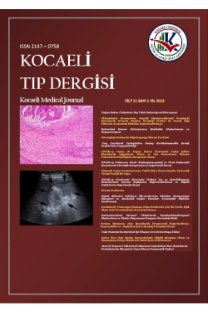İntoksikasyon Dozunda Olmayan Lityum Kullanımına Bağlı Parkinsonizm Tablosu
Parkinsonism Related to Use of Non-Intoxication Dose of Lithium
___
- 1. Grandjean EM, Aubry J.M. Lithium: updated human knowledge using an evidence-based approach part III: clinical safety. CNS Drugs 2009; 23(5): 397-418.
- 2. El Balkhı S, Megarbane B, Poupon J, et al. Lithium poisoning: is determination of the red blood cell lithium concentration useful? Clin Toxicol 2009; 47(1):8-13.
- 3. Wilting I, Egberts A.G.C, Heerdink E.R, et al. Evaluation of available treatment guidelines for the management of lithium intoxication. Ther Drug Monit 2009; 31(2):247-60.
- 4. Adityanjee, Munshi KR, Thampy A. The syndrome of irreversible lithium-effectuated neurotoxicity. Clin Neuropharmacol 2005; 28:38- 49.
- 5. Öge E. Nöroloji. İstanbul Üniversitesi İstanbul Tıp Fakültesi Temel ve Klinik Bilimler. 2004. 426-7.
- 6. Schou M. The recognition and management of lithium intoxication. In Handbook of Lithium Therapy (Ed M Schou):394-402. Lancester, England, MTP Press, 1980.
- 7. Meltzer HL. Mode of action of lithium in affective disorders. An influence on intracellular calcium functions. Pharmacol Toxicol 1990; 66:84- 99.
- 8. Kesebir S, Akdeniz F, Vahip S. Lityum zehirlenmesi. Turk Psikiyatri Derg 2001;12:315-9.
- 9. Schou M, Amedisim A, Trap-Jensen J. Lithium poisoning. Am J Psychiatry 1968;125:520- 7.
- 10. Derinoz O, Unlusoy A, Kanburoğlu K. Etkili sıvı tedavisine yanıt veren lityum zehirlenmesi. Turkiye Cocuk Hastalıkları Dergisi 2009; 3(4):53-6.
- 11. Young W. Review of lithium effects on brain and blood. Cell Transplant 2009;18:951-75.
- 12. Hauger RL, O'Connor KA, Yudofsky S. Lithium Toxicity: When is hemodialysis necessary? Acta Psychiatr Scand 1990; 81:515-7.
- 13. Grueneberger EC, Maria Rountree E, Baron Short E, Kahn DA. Neurotoxicity with therapeutic lithium levels: a case report. J Psychiatr Pract 2009; 15:60-3.
- ISSN: 2147-0758
- Başlangıç: 2012
- Yayıncı: -
Semimembranosus Tendonunda İntratendinöz Ganglion Kisti
Yüksel IŞIK, İsmail TÜRKMEN, Neslihan TAŞDELEN
İntrapartum Fetal Kafa Derisi Laktat Seviyesinin Fetus ve Yenidoğan Sonuçlarını Öngörmedeki Yeri
Pınar ÇAKIR, Gülseren YÜCESOY, Eray ÇALIŞKAN, Özgür ÇAKIR
İntoksikasyon Dozunda Olmayan Lityum Kullanımına Bağlı Parkinsonizm Tablosu
Pınar Bekdik ŞİRİNOCAK, Şeyda ALKAN, Zahide YILMAZ
Rektum Yerleşimli Medüller Kanser: Olgu Sunumu
Gökçen Alınak GÜNDOĞAN, Gülnihal ÖZDEMİR, Metin KEMENT, Ersin GÜNDOĞAN
Kadın Sporcu Üçlemesine Güncel Yaklaşım
Pakize Özçiftçi YILMAZ, ŞULE TAŞ GÜLEN
Mortal Seyreden Tetanoz Vakası: Olgu Sunumu
GÜVENÇ DOĞAN, Arzu Akdağlı EKİCİ, Elif AŞICI, SELÇUK KAYIR
Tırnak Batması Cerrahi Tedavisinde Heifetz Yöntemi Sonuçlarımız
Hemşirelik Öğrencilerinin Olumsuz Otomatik Düşünceleri ve Akademik Başarıları Arasındaki İlişki
AYŞE KARADAŞ, SERAP KAYNAK, SONGÜL DURAN
Yabancı Cisime Bağ Meckel Divertikül Perforasyonu: Olgu Sunumu
Mehmet KARAHAN, Kenan ÇETİN, Aytaç Emre KOCAOĞLU, FATİH SÜMER, Ersin GÜNDOĞAN
